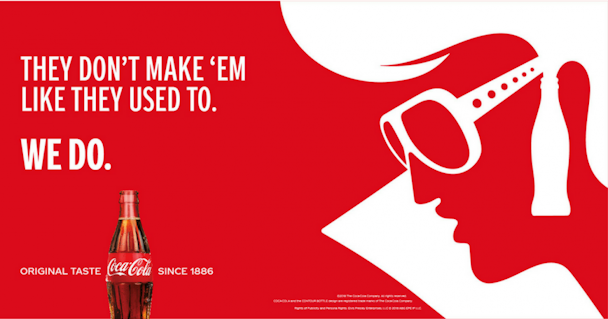People don’t trust brands because… well, why would they?
Trust in UK brands is at its lowest since the 2008 financial crash. Big players like Delta Airlines and Uber have taken massive hits to their reputations. You can blame it on austerity, you can blame it on Brexit, but the bottom line is that people haven’t had much faith in brands for a fair while.

Coke's recent ad campaign "leaves a sour taste"
Brands aren’t doing enough to actually make people care.
They might be active in the public eye, sure, but that old ‘there’s no such thing as bad publicity’ waffle just doesn’t hold water in 2018. While building brand trust might have been lower down the list in bygone days, this is an era of disruption.
Values have changed, and consumer behaviour has changed in the social media age, marked as it is by the virtue-signalling echo chamber, the Twitter courtroom. With social platforms at our behest and more companies trying their best to honour transparency, scandals and examples of malpractice are coming to light at an alarming frequency.
So it’s no wonder people trust brands less - especially seeing as 88% of us want our brands to be more purposeful, more than just stickers on products or straplines we might remember in pub quizzes.
When Oliver carried out our Brand Emotions research a couple of years ago, our results were a premonition of what seems to have become a deeper malaise. We too found that the majority of people are indifferent to brands. Sure, a few brands were found to generate genuine happiness within consumers, but there was an abundance that evoked feelings of ‘hatred’ and ‘frustration’.
Hatred. Frustration. Not exactly the foundations of a healthy relationship.
Yet what some brands do is genuinely frustrating. Because they are trying to build something meaningful with consumers - they’re just doing it wrong. Misjudging the situation. They try and cut through with emotion rather than action.
Emotion is great. It’s essential. We’re humans. We operate based on emotion. But people don’t just want sentiment. They want action. They want results.
Whether that be for philanthropic causes or for their own gain, people want to see that brands are putting their money where their mouths are.
And brands often misinterpret that desire.
Take Coca-Cola’s recent campaign, launching on the same date the sugar tax kicked in. Emblazoned with the silhouette of Elvis and the drinks brand’s iconic logo, the creative simply stated: ‘They don’t make ‘em like they used to. We do.’ Yes, it’s romantic. Nostalgic. The sentiment is sweet, but it leaves a somewhat sour taste.
Because it does nothing for consumers who’ll be spending more money on smaller portions thanks to the sugar levy. It’s Coca-Cola relying solely on heritage, essentially declaring itself the opium of the people, steadfast in the knowledge that customers won’t flock to cheaper options.
Maybe Coca-Cola can get away with this because, well, it’s Coca-Cola, but this shouldn’t be common practice. Brands shouldn’t have to be waiting until industry-culling legislation arrives. It makes them look unprepared. Again, it’s a conclusion we came to two years ago with our own research, but brands still don’t get it: people usually feel more affinity to a brand post-purchase.
And what brands are doing now is knee-jerk stuff. They’re scrabbling. How can you trust an entity that follows whichever way the wind blows?
You can’t. They’re unreliable. Brands need to regain consumer trust and they can do that by actually getting their stories straight. They need to see the era of disruption as an opportunity to think ahead, embedding their messages and values into their campaigns. And then develop the relationship with people, keeping their customers happy and actually following through with their messaging.
Otherwise, people will see right through them.
Sharon Whale is the UK chief executive of the Oliver Group.
